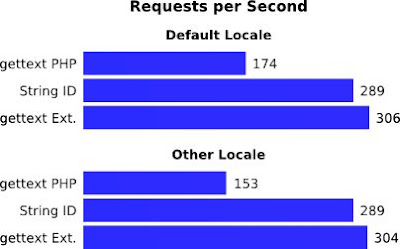Last year, I wrote a post about using gettext to localize PHP web pages. Gettext makes it easy to maintain the translations and always provides a fallback locale. But is it fast?
I created a simple web page to compare the performance of various localization methods for PHP. It only contains 3 localized strings and does not use advanced features of gettext (e.g. plurals). I wrote a version using the gettext PHP extension (”gettext Ext.”), one using PHP-gettext (”gettext PHP”, a gettext implementation written in pure PHP) and a version that does not use gettext at all, instead it uses an array that contains all the translations (”String ID”).
I put all three pages on a Debian machine with the latest Apache 2.0.55 and PHP 5.1.2 and used the Apache HTTP server benchmarking tool to measure the performance of the different methods. I always made two tests - using the default locale (English) and a translation (German), because gettext does not have to use a locale file for the default language (it’s embedded in the page).
The results
Here are the results (requests per second, more is better, I used “ab -n 5000 URL”):
As you can see, the version using the PHP gettext extension is the fastest solution. It is only marginally slower when using a language file, because the extension caches the translations (the downside is that you have to restart the webserver when you change a locale file). The String ID version is equally fast for either locale, because it always has to lookup the text in the locale array. The pure PHP gettext implementation is the slowest solution, and even slower when it needs to use a locale file. This is understandable because it always has to read the whole file for every request.
You can download the test files if you’re interested.
The gettext extension
When using the gettext extension on Linux, make sure all used locales are installed on the system. For example, in Debian (and probably other distributions, too), add the required locales to /etc/locale.gen and run locale-gen. For this test, I added “de_DE.UTF-8 UTF-8″ for the German UTF-8 version.
Conclusion
The native gettext extension for PHP performed best in the benchmarks. Using the gettext Extension allows you to create clean code by only wrapping strings in _() and including a file that loads the localizations. As I already wrote in my previous post, gettext also allows painless updates of the localizations by automatically finding new or changed strings. The only downside is that the webserver must be restarted to load the new language files. This can be a problem for users on shared hosts. In these cases, a pure PHP implementation can be used (which is not very fast though).
If you can restart the webserver, I recommend using gettext. It is very useful especially for larger projects or projects where not all translations can be updated simultaneously, because it always provides a fallback language. It also makes the source code much easier to read, because the default texts are directly in the source code.
Автор: Pablo Hoch.
Интересное...
Комментарии:
Localizing PHP web sites using gettext » Pablo’s Development Blog Says:
April 10th, 2006 at 2:15 pm
[...] See my follow-up post “Benchmarking PHP Localization - Is gettext fast enough?” for Benchmarks. In general, the gettext Extension is faster than using a String-Array. The pure PHP implementation of gettext is slower and not recommended if you can use the PHP Extension. [...]
Brice Burgess Says:
April 12th, 2006 at 2:16 am
In case anyone was wondering, it appears that this benchmark used PHP Gettext with cache support included (enabled by default). This was added by Nico Kaiser in version 1.0.3+ of PHP gettext released March 2005.
It would be frightful to see the results w/o cache enabled.
Pablo Hoch Says:
April 12th, 2006 at 10:48 am
Brice: Yes, I used the default PHP gettext options, so the cache was enabled. However, I have just compared the performance of PHP gettext (1.0.7) with cache on vs. cache off and I didn’t see any significant performance difference.
Here are my results:
PHP gettext, cache on: default locale = 175 rps, other locale = 148 rps
PHP gettext, cache off: default locale = 175 rps, other locale = 147 rps
I assume this is because there are only three localized strings. It could make a difference when you have more strings.
Jim Plush Says:
April 14th, 2006 at 12:54 am
I also did some benchmark tests when my last company needed an i18n ready site. might be worth a read ***
Richard Thomas Says:
April 16th, 2006 at 4:04 am
I am also working with gettext and have managed to combined it with savant temlate system.
Using a savant plugin I can translate on the fly, or with a script pretranslate all the templates so gettext doesnt need to be used on the live site ***
David Says:
April 17th, 2006 at 7:53 am
We have used both methods and find gettext not only easier in the long run for updates, but faster also.
Zhitao Ma Says:
April 18th, 2006 at 3:12 am
My test results are in the following,
Requests per Second
gettext-ext 395.63
gettext-php 221.12
stringids 568.66
I tested them on a Windows XP SP2 computer with the Apache 2.0.55 and PHP 5.1.3-dev. It seems that the results are quite different on Windows and Debian.
Hm-ohj2006 : blogi » Blog Archive » PALAUTUS: Gettextillä Railsia lokalisoimaan. Says:
April 28th, 2006 at 4:36 pm
[...] Gettext-tuki löytyy myös PHPstä, mutta Railsissa sen eteen on jo tehty valmiiksi töitä. Näin käyttöönotto on suoraviivaisempaa ja muutamalla lisäyksellä (mm. Rakefilen lisätehtävätä) todella vaivatonta. Lisäksi tehokkuusmielessä on Gettextin oikeanlainen käyttö varsin nopeaa. PHP:lle sitä onkin testattu ainakin yhden tapauksen verran ( [1] ). [...]
Jan Schneider Says:
May 9th, 2006 at 1:09 am
On most shared hosts a web server restart is not required because they often use either CGI PHP SAPIs. These don’t cache the locale (because it’s actually the web server process, not PHP that is doing the caching), so locale updates work instantly.
links for 2006-06-26 at 59ideas Says:
June 26th, 2006 at 6:19 pm
[...] Benchmarking PHP Localization - Is gettext fast enough? » Pablo’s Development Blog (tags: php i18n) [...]
links for Jun 19-26 at 59ideas Says:
June 27th, 2006 at 8:00 pm
[...] Benchmarking PHP Localization - Is gettext fast enough? » Pablo’s Development Blog (tags: php i18n) [...]
Quellen zu Internationalisierung und Lokalisierung » contactsheet Says:
May 3rd, 2007 at 9:52 am
[...] Benchmarking PHP Localization - Is gettext fast enough? in einem inzwischen etwas älteren Artikel nimmt Pablo Hoch drei verschiedene Techniken unter die Lupe: native PHP-Arrays, PHP-gettext sowie die Kombination aus PHP-gettext-Extension und locale. [...]
Kruxik Says:
August 10th, 2007 at 4:01 pm
If you use mod_php (not CGI) and have problem with cached dictionary after its update there is one solution which doesn’t need webserver restart. You can create the domain name dynamicly and change it whenever you change the dictionary.
Example: standard name (domain) of the dictionary is messages.mo - means domain is “messages”. You can rename the file to “messages1.mo”, and tell PHP to change domain from “messages” to “messages1″.
This solution is 100% functional (we use it for our CMS gettext editor).



Комментариев нет:
Отправить комментарий